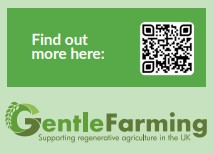Written by Thomas Gent from Gentle Farming

Regenerative Agriculture is becoming a buzzword in the non-agricultural business community, sustainability and the circular economy will become more impactful in the coming years. Consumers are now aware of the eco credentials of the businesses they are spending their money with. This is driving businesses across the country to consider their own environmental impacts. Major companies are committing to achieving net zero in the coming decades. UK farming and food production has a significant opportunity to play an important role in this.
I am Thomas Gent, we have a family farm in South Lincolnshire and have been farming regeneratively for around 12 years. I have founded Gentle Farming. Gentle farming is an organisation looking into this opportunity and how we can connect farmers with businesses who are interested in supporting regenerative farming. The health of our soils directly impacts the health of society. We began by focusing on soil carbon and soil testing but quickly realised this is a complex problem and there are currently no concrete answers. Soil testing is notoriously inconsistent and volatile. However, it will be a crucial part of the picture as methods develop. This led to the thinking of regenerative agriculture as a whole farm system.
Using the regenerative agricultural principles, we are creating a brand and giving business the opportunity to invest and play a part in this important work. We are offering businesses the opportunity to work with a group of the most innovative and prominent UK farmers leading the way in regenerative practices. Using online calculators, research and previous soil testing we can build a picture of the amount of carbon our farms are storing and sequestering each year. I believe carbon offsetting money from the private sector will become a major part of the payments farmers will be able to receive in the future.
We are working with several organisations including a group of leading universities and UN climate change international partners to find a certified solution to carbon offsetting. It is looking very likely that this may be certified within the year. As soon as these pilot schemes come into action, we will be in the position to sell certified soil carbon credits.
But until this happens we are focusing on the corporate social responsibility sector allowing us to build a system and a brand for working with farmers championing regenerative agricultural practices. Corporate social responsibility will also play a large part in the potential payments farmers could receive for farming regeneratively. With subsidies coming to an end this could be an opportunity for farmers to access funding. Businesses will want to be able to work with an established credible community of farmers. Our potential group of farms are spread across the country and so can be local to any business. We plan to facilitate the opportunity for clients to visit farms to learn hands-on what we are doing day in and day out and to share our values.
This is a huge opportunity for UK farming and if we act decisively and quickly we can become actively involved in the market and the conversation around pricing. Through this opportunity farmers can have a significant impact in mitigating climate change, working towards net zero and providing many environmental benefits. The possible funding streams are an incentive for farmers across the country to implement sustainable farming practices to the benefit of all.
